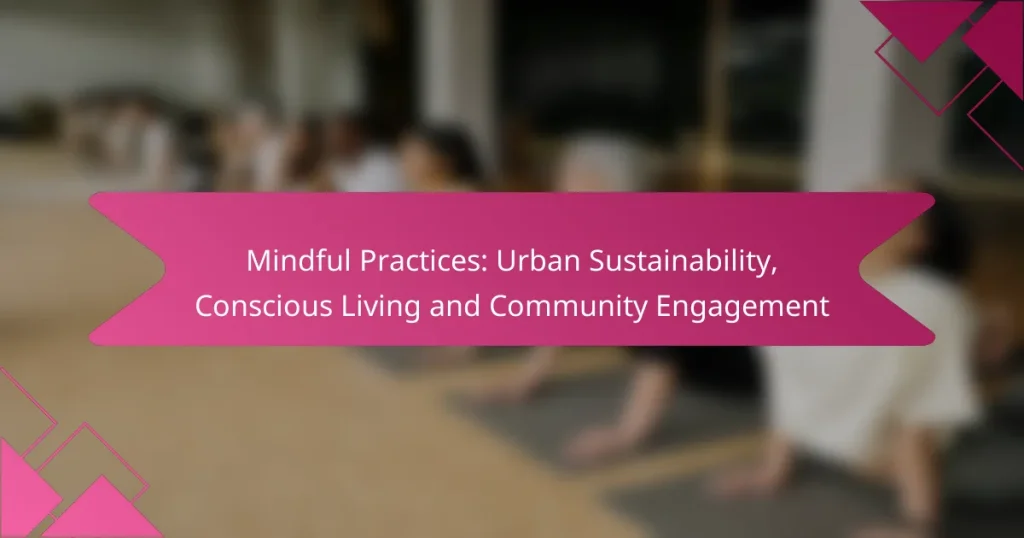Mindful practices in urban sustainability focus on fostering environmental health, social equity, and economic viability through intentional actions. By promoting community engagement and encouraging individuals to make conscious choices, these practices enhance well-being while addressing the pressing challenges of urban living. Together, they create a collaborative framework that empowers residents to take responsibility for their environment and contribute to a more sustainable future.
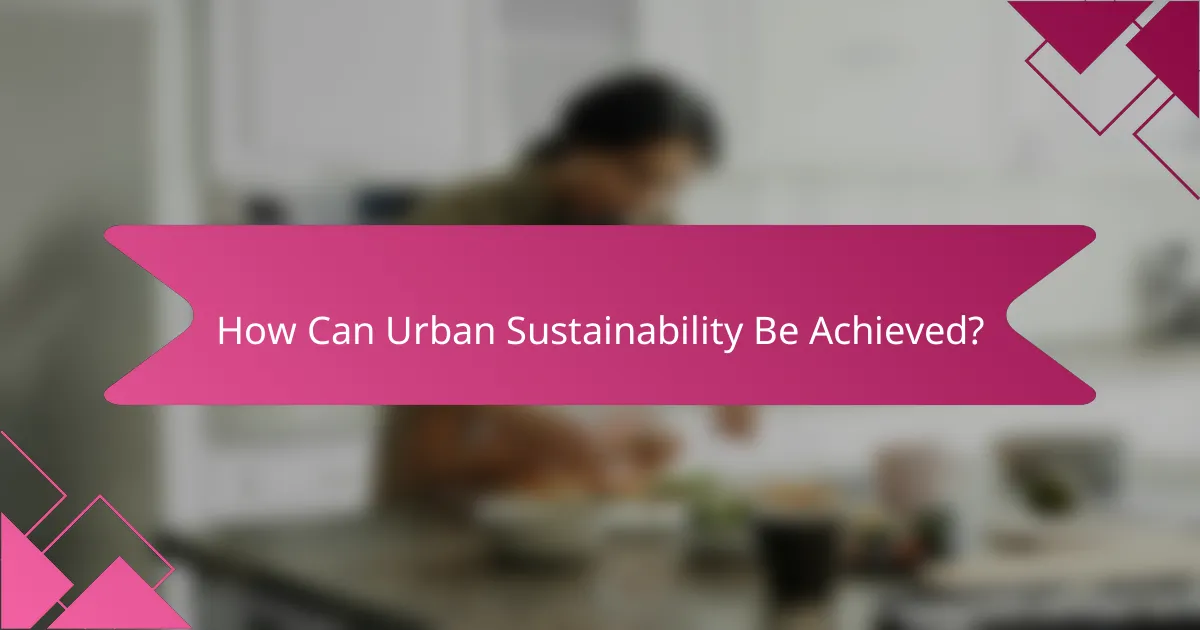
How Can Urban Sustainability Be Achieved?
Urban sustainability can be achieved through a combination of innovative practices that promote environmental health, social equity, and economic viability. Key strategies include implementing green infrastructure, reducing waste, adopting renewable energy, enhancing sustainable transportation, and fostering community gardens.
Green Infrastructure Implementation
Green infrastructure involves integrating natural processes into urban planning to manage stormwater, improve air quality, and enhance biodiversity. Examples include green roofs, permeable pavements, and urban forests. These solutions not only mitigate flooding but also provide recreational spaces and improve overall urban aesthetics.
To implement green infrastructure effectively, cities should assess their specific environmental challenges and prioritize projects that yield the highest ecological and social benefits. Engaging local communities in the planning process can ensure that these initiatives meet the needs of residents.
Waste Reduction Strategies
Waste reduction strategies focus on minimizing waste generation through practices like recycling, composting, and promoting a circular economy. Cities can implement programs that encourage residents and businesses to reduce, reuse, and recycle materials, significantly lowering landfill contributions.
Effective waste management policies may include incentives for businesses that adopt sustainable practices and educational campaigns to raise awareness about waste reduction. Establishing clear guidelines and accessible recycling facilities can help streamline these efforts.
Renewable Energy Adoption
Adopting renewable energy sources, such as solar, wind, and geothermal, is crucial for reducing urban carbon footprints. Cities can invest in renewable energy infrastructure and provide incentives for homeowners and businesses to install solar panels or participate in community energy programs.
To maximize the benefits of renewable energy, urban planners should consider integrating energy-efficient designs in new developments and retrofitting existing buildings. This holistic approach can lead to significant energy savings and lower utility costs for residents.
Sustainable Transportation Options
Sustainable transportation options include public transit, cycling, walking, and electric vehicles, all aimed at reducing reliance on fossil fuels. Cities can enhance public transportation systems, create dedicated bike lanes, and promote car-sharing services to encourage eco-friendly commuting.
Investing in infrastructure that supports these modes of transport can lead to reduced traffic congestion and improved air quality. Local governments should also consider policies that incentivize the use of sustainable transport, such as tax breaks for electric vehicle users or subsidies for public transit riders.
Community Gardens and Urban Farming
Community gardens and urban farming initiatives promote local food production, enhance community engagement, and improve access to fresh produce. These spaces can be established in vacant lots or parks, allowing residents to cultivate fruits and vegetables while fostering social connections.
To support these initiatives, local governments can provide resources such as land access, gardening tools, and educational workshops on sustainable agriculture practices. Encouraging participation from diverse community members can help ensure the success and sustainability of these projects.

What Are Mindful Practices for Conscious Living?
Mindful practices for conscious living involve intentional actions that promote sustainability, well-being, and community engagement. These practices encourage individuals to be aware of their choices and their impact on the environment and society.
Minimalism and Decluttering
Minimalism focuses on simplifying one’s life by reducing excess possessions and distractions. This approach not only creates a more organized living space but also encourages individuals to prioritize what truly matters to them.
To practice minimalism, start by decluttering your home. Aim to keep only items that serve a purpose or bring you joy. A common guideline is the “one in, one out” rule: for every new item you bring home, consider removing one existing item.
Mindful Consumption Choices
Mindful consumption involves making thoughtful decisions about what to buy and how it affects the environment. This includes considering the source, production methods, and sustainability of products before purchasing.
To adopt mindful consumption, prioritize local and organic products when possible. Look for certifications like Fair Trade or USDA Organic to ensure ethical and sustainable practices. Avoid impulse buying by creating a shopping list and sticking to it.
Eco-Friendly Home Practices
Implementing eco-friendly home practices can significantly reduce your environmental footprint. Simple changes, such as using energy-efficient appliances and reducing water usage, can lead to substantial savings and a healthier planet.
Consider adopting practices like composting kitchen waste, using reusable bags, and switching to LED lighting. Additionally, explore options for renewable energy sources, such as solar panels, which can provide long-term benefits and savings.
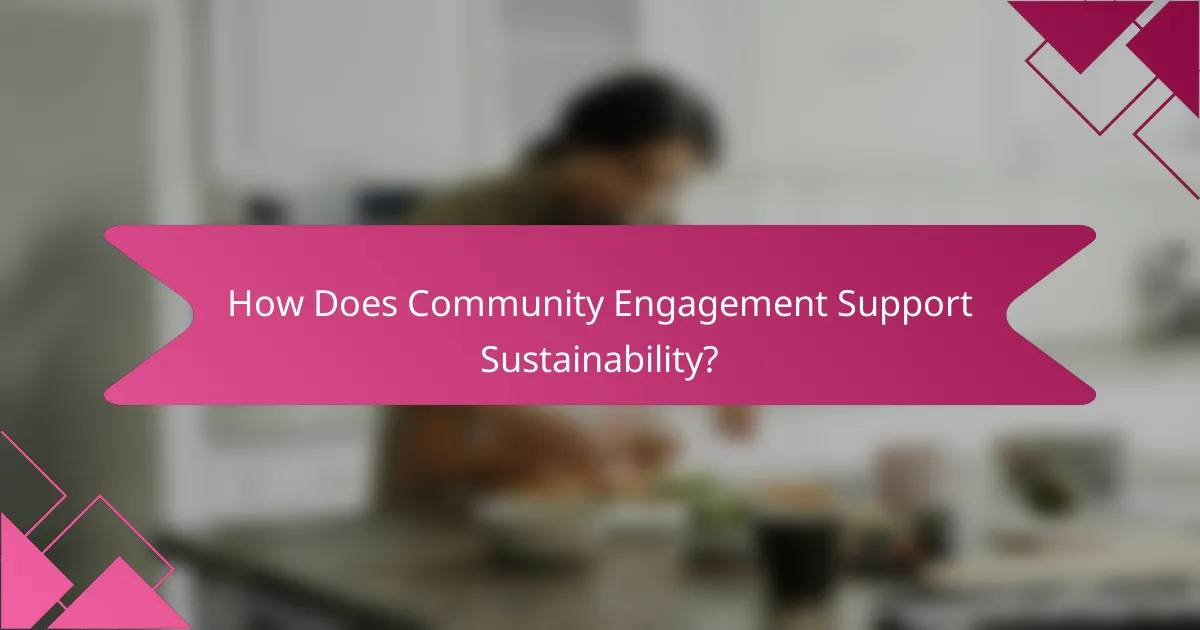
How Does Community Engagement Support Sustainability?
Community engagement plays a vital role in promoting sustainability by fostering collaboration among residents, local organizations, and governments. It encourages collective action towards environmental goals, enhances social cohesion, and empowers individuals to take responsibility for their surroundings.
Local Workshops and Events
Local workshops and events serve as platforms for community members to learn about sustainable practices and share ideas. These gatherings can cover topics such as urban gardening, waste reduction, and renewable energy solutions. Participating in such events can help residents gain practical skills while building connections with like-minded individuals.
Consider attending or organizing workshops that focus on actionable steps, such as composting or energy efficiency. Look for events hosted by community centers, libraries, or environmental organizations, often free or low-cost.
Volunteer Opportunities in Urban Areas
Volunteering in urban areas provides hands-on experience in sustainability initiatives, such as tree planting, community clean-ups, and habitat restoration. These activities not only improve the local environment but also strengthen community ties and foster a sense of ownership among participants.
To find volunteer opportunities, check local non-profits, municipal websites, or platforms like VolunteerMatch. Engaging in these activities can take a few hours to a full day, making it accessible for various schedules.
Collaboration with Local Organizations
Collaborating with local organizations amplifies the impact of sustainability efforts by pooling resources and expertise. Partnerships can lead to larger projects, such as community gardens or educational programs, that benefit the entire neighborhood.
Identify organizations that align with your sustainability goals, such as environmental groups, schools, or local businesses. Establishing these connections can lead to shared initiatives, funding opportunities, and a broader reach within the community.
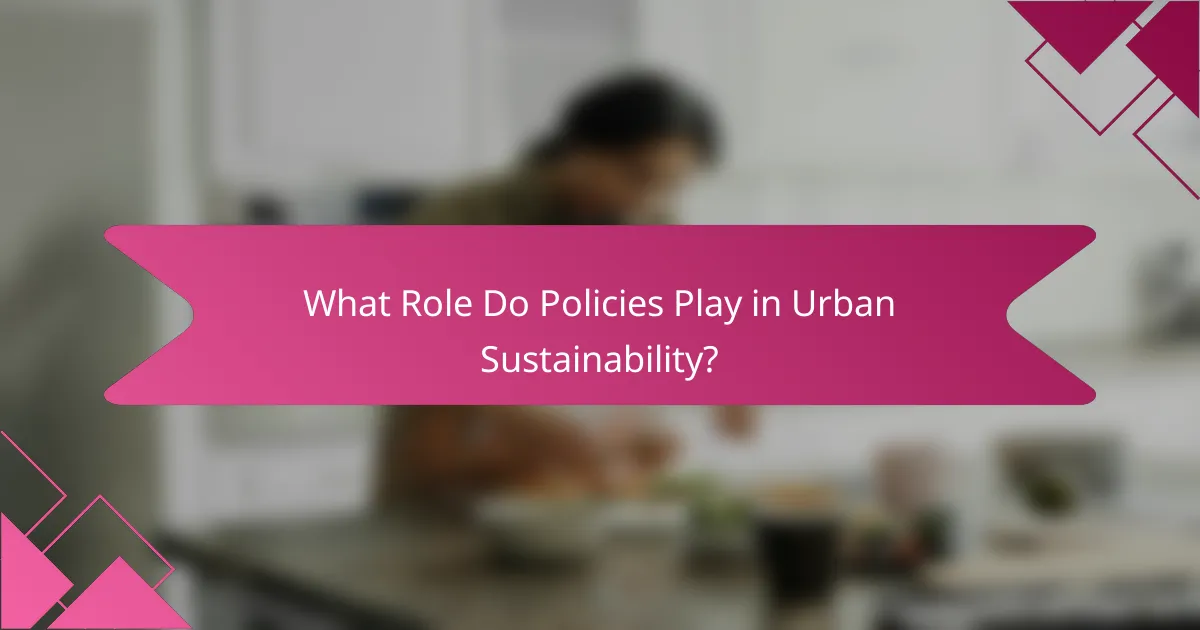
What Role Do Policies Play in Urban Sustainability?
Policies are crucial in shaping urban sustainability by establishing frameworks that promote environmentally friendly practices and community engagement. They guide resource allocation, incentivize green initiatives, and enforce regulations that collectively enhance urban living conditions.
Government Incentives for Green Projects
Government incentives for green projects can significantly boost urban sustainability efforts. These incentives often come in the form of tax credits, grants, or subsidies aimed at encouraging businesses and homeowners to adopt eco-friendly technologies, such as solar panels or energy-efficient appliances.
For example, in many cities, local governments offer financial assistance for installing green roofs or rainwater harvesting systems. This not only reduces the overall environmental impact but also enhances community resilience against climate change.
Regulations on Waste Management
Regulations on waste management are essential for maintaining urban sustainability by minimizing waste production and promoting recycling. Many municipalities have implemented strict guidelines that require residents and businesses to separate recyclables from general waste, often accompanied by fines for non-compliance.
Effective waste management regulations can include mandatory composting programs and limits on single-use plastics. Cities that enforce these regulations typically see a significant reduction in landfill waste, contributing to cleaner urban environments and improved public health.
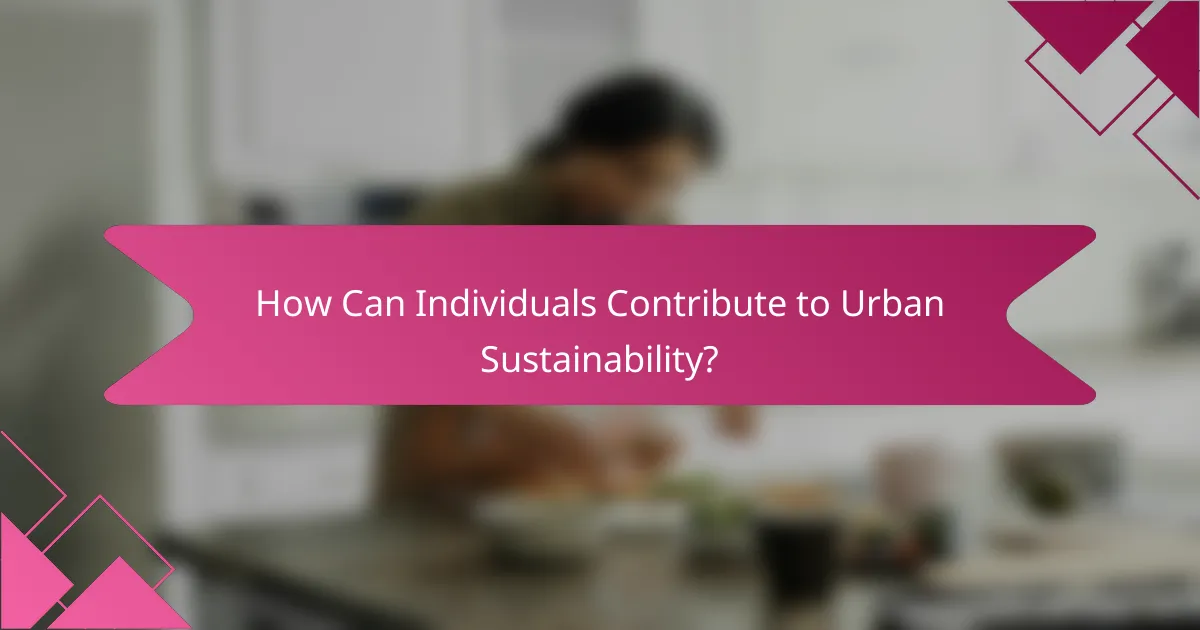
How Can Individuals Contribute to Urban Sustainability?
Individuals can significantly impact urban sustainability through conscious choices and community involvement. By engaging in local initiatives and advocating for eco-friendly practices, people can help create greener, more resilient cities.
Participating in Local Clean-Up Initiatives
Joining local clean-up initiatives is a direct way to contribute to urban sustainability. These events often focus on removing litter from parks, streets, and waterways, which helps maintain the environment and promotes community pride.
To get involved, look for organized events through community centers, environmental organizations, or social media groups. Participating regularly can foster connections with like-minded individuals and encourage ongoing commitment to sustainability.
Advocating for Sustainable Practices
Advocating for sustainable practices involves promoting eco-friendly policies and behaviors within your community. This can include supporting local legislation aimed at reducing waste, conserving energy, or enhancing public transportation systems.
Consider joining local advocacy groups or attending city council meetings to voice your support for sustainability initiatives. Simple actions, such as encouraging neighbors to reduce plastic use or participate in recycling programs, can create a ripple effect, inspiring others to adopt similar practices.

What Are the Benefits of Mindful Living?
Mindful living offers numerous benefits, including enhanced emotional well-being, improved focus, and stronger community connections. By practicing mindfulness, individuals can cultivate a greater awareness of their thoughts and surroundings, leading to a more fulfilling and sustainable lifestyle.
Improved Mental Health
Mindful living significantly contributes to improved mental health by reducing stress and anxiety levels. Engaging in mindfulness practices, such as meditation or deep breathing, can help individuals manage their emotions more effectively and foster a sense of calm.
Research indicates that regular mindfulness practice can lead to lower rates of depression and increased resilience. Simple techniques, like dedicating a few minutes each day to focus on breath or surroundings, can yield substantial mental health benefits over time.
To enhance mental well-being, consider incorporating mindfulness into your daily routine. Start with short sessions, gradually increasing the duration as you become more comfortable. Avoid distractions during practice, and create a peaceful environment to maximize the positive effects.
